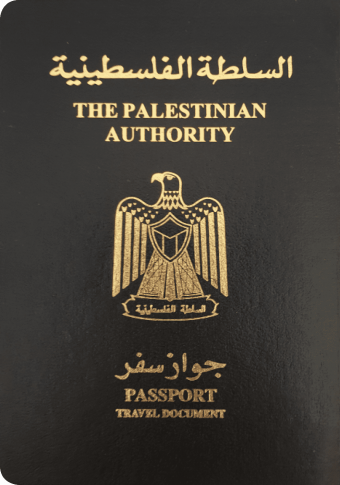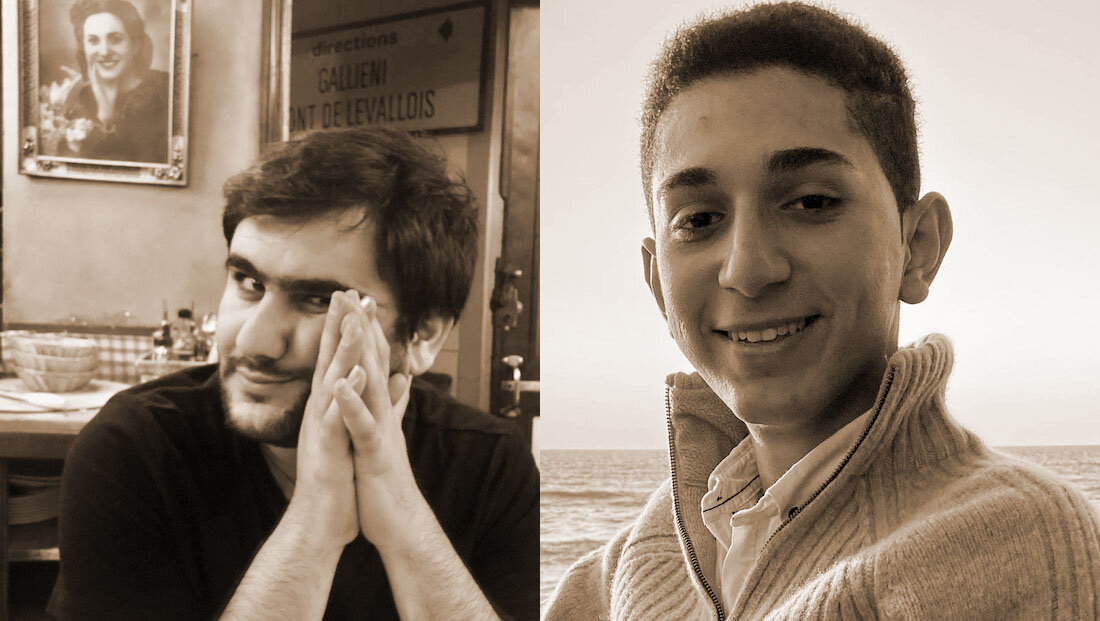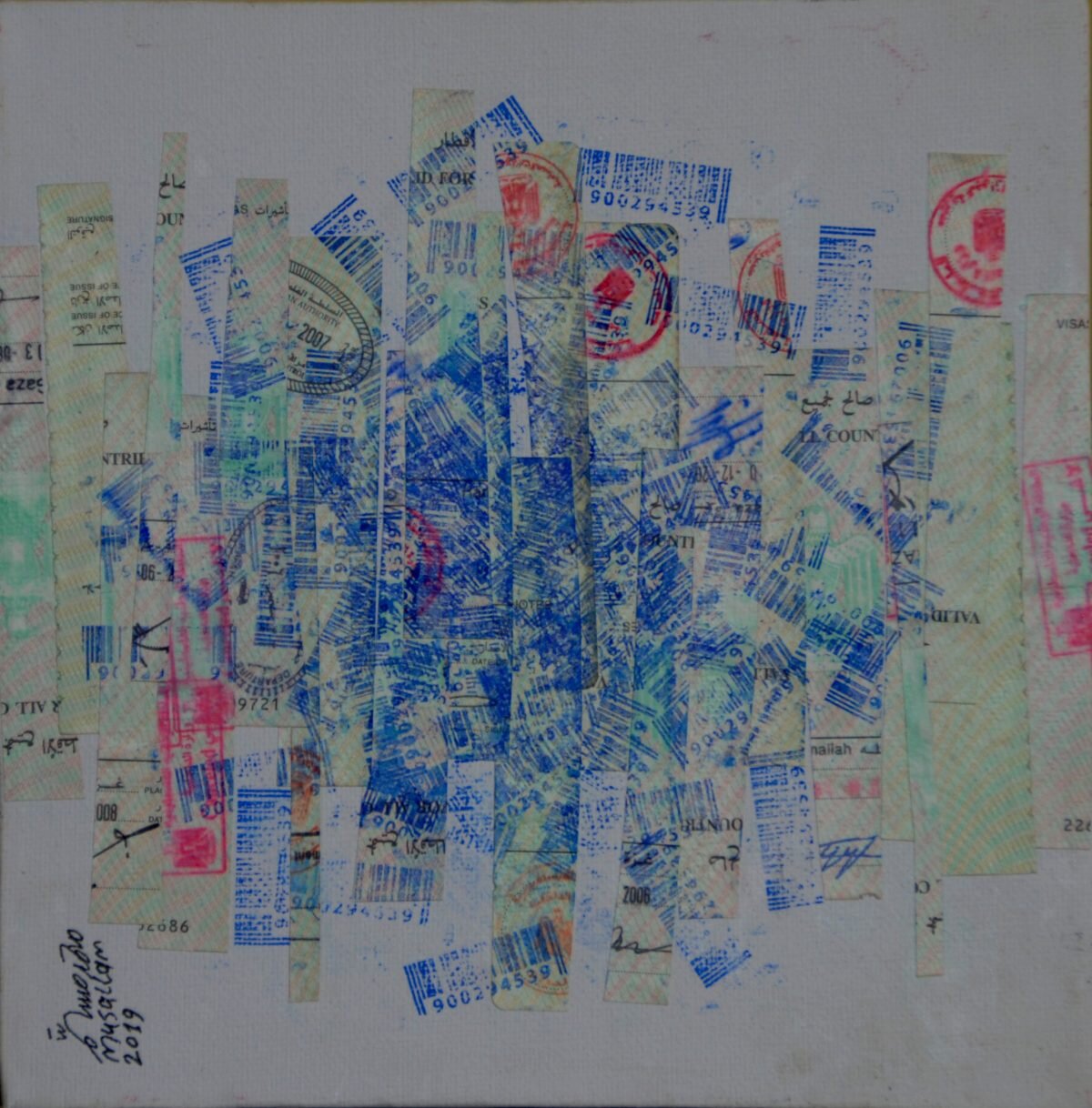Two Palestinians write together about the recent events in Gaza, to interrogate their memories of the events as well as how they affect their understanding of their Palestinian identities. “Gaza, You and Me” revolves around a Palestinian from the Gaza Strip stuck in the conflict, and a Palestine from the West Bank who is currently living in the USA trying to escape even thinking about it. Both Palestinians in this essay are really the same, if it weren’t for the age and location differences — you might say NG is the future Abdallah and Abdallah is the past NG.
NG Mahfouz* & Abdallah Salha
Holding my head tightly, I sit on a couch trying to take in the moment — in denial. It is nine in the evening, and the electricity is gone for the day. The comfort of my bed and desk are only a room away from where I am sitting. I have voluntarily given them up to my younger cousins, thinking I could afford them a temporary “comfortable” resettlement. My laptop is in front of me now as its battery is running out — we are staring into each other, thinking we owe the world sharing this moment. Words, like everything in Gaza, start to slip away, losing form and substance.
Rockets and warplanes are whistling in the skies, filling an otherwise empty dark expanse, displacing even the mighty stars. War never felt okay to me; it has never given me any comfort. Rather, war always compounds loss and bereavement, imposing itself on my thinking and judgement. For all my life, I have lived through its endless vicious cycles, and every time, I have found myself in awe after losing parts of myself that I did not know exist. Sitting alone on the couch this evening, I surprise myself — again — when I entertain the morality of war and violence around me. Moral dilemmas keep creeping into my head, and I grant them more of my time than I can afford.
“Walk close to house walls,” my mom shouts at me as I leave to the closest grocery store, assuming the walls will keep me sheltered from post-explosion shrapnel. In this moment, I am reminded by Ghassan Kanafani’s admission of walking under the rain as a child, getting his head wet by the water descending from the drainpipes while walking next to house walls in a Yaffa neighborhood. I say this to my mother. She promptly rolls her eyes: She hears this joke from me often, and she is tired of it. “I do not want to lose you,” she says somberly. Everything feels real — on my skin and all over my body, I feel the potentiality of fulfilling my humanity and its possible extinguishment. It is quite late now, and I assess the safety of going to the store. I want to buy jibneh bayda, salty white cheese, so that we have sandwiches later tonight or early tomorrow morning.
I wake up in pain and sweat, too early. My stomach is in convulsion, spasmodically tearing into itself. My ears are empty infernos, echoes of each other. My eyes are salt deserts, refusing to open. In darkness, I sink into my bed of sorrows, trying to escape myself. Everything around me feels okay, but I am not. Everything around me feels real, but I am not.
I turn on the noisy window air conditioner both to cool my body and distract my mind. I hope its noise cancels the sounds of bombardment coming from Gaza more than five thousand miles away. In the material comfort of the United States of America, I often find myself at ease shutting out what does not comfort me. But almost a year after the George Floyd protests, I find myself having a harder time ignoring Gaza. I hear the bombardment, and I think of the incoming ground invasion, but it is too early in the morning, and I want to have my diluted American coffee.
I walk down the stairs slowly, my eyes barely open. I grind coffee beans, pour filtered water into the coffee machine, fill the gold-plated cone with the ground beans, and set the magic in motion. Soon, the coffee aroma permeates through the dense humid air, opening my eyes to the dimly lit house. I hear the birds waking up, vehicles traveling in the distance, even a favorite freight train. I prepare one large cup of coffee for myself.
It is hot, and it is very bitter. I always select bold on the machine, and evidently never choose the right coffee–water ratio. My coffee is not diluted enough; it is not American enough. The noisy bombardment of Gaza fills my head again.
As I walk outside, I continue to feel the heaviness of the war on my skin — everything feels more real now, including, especially, death. No matter, I hurry to the store. “The personal is political,” I often read. We always have to keep a facade of joy and resilience — of normalcy — and to preach to the world about peace, as if it starts within us, by us.

On my way back from the store, I feel trauma engulfing me. I hurry again, I almost run, and I tell myself, “You don’t have time to process any trauma now.” Processing trauma and dealing with it are post-survival activities, and I am yet to survive. Such is the denial of trauma while it is happening. Running Orders come late, I say loudly to myself, “and you may want to ignore them, but that doesn’t do you any good.” A Running Order feels superficially ethical — it seemingly spares some civilians by ordering them to run out of their homes merely minutes before a devastating bombing. Sometimes though, it does not get to them in time; other times, nobody bothers delivering it. All the time, it is neither fair nor moral to deprive anyone of their home, their livelihood, and all the memories of a lifetime. I wonder: If I do not have time to process my trauma, how do I have time to debate the morality of war?
I arrive back home; my mother breathes a sigh of relief. I leave the jibneh bayda on a table, and I immediately pack my papers and a change of clothes. I look at my Palestinian “passport”, a travel document that brings with it innumerable challenges at every frontier, and I feel the bitter injustice that I still cannot get a United States of America visa stamp to attend college — the forever blockade, the disruptive pandemic, and now this war. My mother kindly prepares my cheese sandwich and brings it to me. I take a big bite, and then I pause. I am eating this sandwich so that I can stay up all night: to witness the symphony of destruction at midnight. I have second thoughts: Maybe I should sleep tonight. I remember: To be awoken by the noise and shaking of bombs is worse. Waking up to fear clutching your gut and holding you from the neck is not fun. I quickly finish eating my sandwich. I lie on the couch, staring at the ceiling that may not be there tomorrow morning. Still, I cannot stop thinking about other Palestinians who are affected worse now, and Palestinians who left their houses during the Nakba to survive. In 1948, our Nakba started and has never ended.
I try to run away from the noise crowding my head. I open the door to catch fresh air.
Immediately, the noxious hydrogen sulfide polluting this post-industrial American city in a meteorological inversion shoves me inside again. I turn around, I go back to my bitter coffee on the table. The sounds from Gaza jump out of my head, filling the musty kitchen, dancing violently with the coffee aroma.
I attempt again. This time, I turn to Otis Redding’s “Cigarettes and Coffee” from The Soul Album released in 1966. Yes, it is early in the morning, but I am not talking to my muse over cigarettes and coffee. Indeed, I do not smoke at all. I turn the music off when he soulfully sings that he wants “another drink of coffee” — with “no cream and sugar” because he has his “darling.” With the noise filling my head and the space surrounding it, I continue to manically browse my smartphone for an escape. Wherever I look, I find imagery of the violence in Palestine. I carry my huge cup of coffee and take it to the living room nearby.
I find myself a short reprieve in the living room. I sit on the comfortable couch, with the hot cup of coffee in my hand. In this moment, I decide to drink my bitter coffee. The hot fluid flows down my throat, itching its bitterness all inside me and finally delivering a nauseating bomb to my stomach. My sharp stomachache intensifies. I extend my tired body over the couch, and I continue drinking my coffee. I feel the dense air around me, now invaded by the pungent hydrogen sulfide which smells like rotten eggs. With the noise all around me, I see the Gaza Strip in front me, a walled rectangle by the sea — with showers of white phosphorous raining fire. In a bird’s-eye view, I see a walled Garden of Eden surrounded by giant dinosaurs on three sides and Noah’s Deluge on the fourth. While the imprisoned human masses rush away from the phosphorous fireworks, I am unmoved in my living room, slowly drinking my coffee. White phosphorus burns midair, causing both severe burns upon skin contact and eye and respiratory irritation, not to mention its acrid odor. With images of phosphorus burning skin in front me, I start to fall asleep again.
Something does not smell quite right. I stand up to shut the window in the living room. Maybe it is tear gas coming with the east wind. I lie down again on my couch, and automatically shrink myself like a fetus, holding my smartphone. Its battery is almost gone. I hear my stomach churning — is it fear, anticipation, or just digestion?
I see an American friend of mine on social media, announcing taking time off because of the Gaza events. I wish I could do the same. This is a well-meaning friend who is sympathetic with and supportive of the Palestinian cause. Yet, I feel lost, abandoned, and sunken in fear — alone. Some friends contacted me when this new round of violence started, and for them, that was enough: I would be fine. Others have not bothered at all. Palestine does not fit their aesthetic. They support each and every plight for liberty, justice, and dignity, but Palestine is too complex, too controversial, too two-sided for them.
In slow motion, I pull my blanket to cover my body. I continue to cover my head. I find refuge hiding in its warmth. It shelters me from the bombs and losing a friend on social media, or at least, that is my magical thinking. I take my laptop and my smartphone under the blanket with me, grasping for every bit of warmth for us. I want to keep some charge in their batteries for tomorrow if I still make it. I fall asleep asking my blanket, “Will you keep holding me tomorrow if I am wrapped in rubble like the jibneh bayda in my cheese sandwich?”
Out of breath and confused, I wake up from my nightmare. I search for my smartphone, but I cannot find it. I call for it, “Where are you?” Its robotic voice comes from under the bed, “Here!” It is three in the morning, and the world has not ended — there are no notifications on my lock screen. Abnormally for May, the weather is chilly outside: a serene spring morning with no foul smell of industrial odors. I take a deep breath, pushing my head back into the soft pillow.
I have a habit of forgetting my dreams and nightmares very shortly after I wake up. I start wondering if I can learn anything from my nightmare, if it has any subliminal messages. I sleepily lose my train of thought, and slowly turn left to my phone. I feel relieved that the person in my nightmare is not really me. In a place where my own national identity is continually challenged and erased, I feel relieved that I am still me — Palestinian in pain and in happiness, not trying to ignore the pain and suffering of my fellow Palestinians in Gaza. But at the same time, I also worry that is the apathetic person I will become as I continue living in the United States of America, caring less and less even about my own people half the world away.
More importantly, I feel relieved as I navigate to Abdallah’s profile on my phone, “Last seen today at 2:30.” I have only met Abdallah a few months prior, through our high school movement’s alumni network. I feel relieved he likely is still alive. I start typing a message to him, to say that I will be available should he like to talk. I stop myself, thinking he already knows that. Deeper, I feel ashamed that I cannot be there for him, that I cannot do more to help him and other Palestinians. In Abdallah, I see a version of my younger self: full of vitality and eagerness to change the world. I worry for his youthful energy and hope as he embarks on his journey. For now though, I feel good about his safety and how our friendship takes me closer to my Palestinian roots.

* NG Mahfouz, a Palestinian from the West Bank, holds a doctorate in engineering and has been living in the United States of America for more than ten years, currently working as a research scientist at an academic institution.




